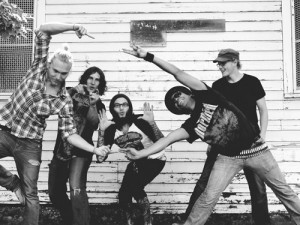Methodical songwriting guides Calgary metal band
by Sarah Kitteringham
The Reflector
When I walk into the Canterbury Castle — the name given to the house of extreme progressive metal band Promethean Labyrinth — several things are immediately striking. A bloody, dismembered mannequin clad in a metal t-shirt sits on the couch; her name is Dolores. The grotesquely disfigured Lucille is strung up on the opposite wall. A starkly altered James Dean poster urges all to “Dream as if you’ll live forever, live as if you’ll die today.”
These macabre adornments hardly characterize the five chatty, affable men who sit on the several couches in the dimly lit room. Four are members of the Promethean Labyrinth; one friend videotapes the interview for the band’s MySpace video series, “Transmissions.” Present are vocalist Maria Joaquin, guitarist/vocalist Brendan Doll, bassist/vocalist Chad Lagore, and drummer/vocalist Andrew Squires. Guitarist/vocalist Jordan Chamberlain is absent.
“This is an interesting band because for most bands they sit there and they jam out all their riffs,” begins Lagore. The Promethean Labyrinth plays a style of highly technical and conceptualized metal. The time signatures are ever-changing; squealing guitars weave between harmonious vocals that abruptly transform into scratchy howls. The bass drum hammers methodically away, and suddenly a cymbal crash will mark the abrupt end. This level of technicality demands a unique writing style.
“It’s hard for us to jam out something that’s new and abstract,” admits Doll. “We do jam, that’s where the ideas for our tabs come from. But it would be really hard for us to throw together the songs that we have in a jam room and memorize the time signature change.” Instead, they write riffs, transcribe them into a tabbing program, or write them down by hand, then organize the riffs and work on it individually and as an entity to make it work. Although it’s an involved, methodical approach, it’s changed little since their inception in 2009 — save for the slight changing of structure with the addition of a vocalist that took more than 40 tries to get right.
“We took the standard of not settling, we wanted to find someone as experimental as we were,” says Lagore. Joaquin tried out for the band in June, despite living hours away in Camrose. He now spends nearly every weekend in Calgary, and the band feels it increases their proficiency because they need to have parts, section and songs done for when their vocalist is in town. It’s resulted in an increased appreciation for song writing from the bandmates.
“We don’t want to lose the tech ever, and we always want to strive for something that is complex and hard for us to play, but it has to be good songwriting and there has to be something everyone can take from it,” clarifies Squires.
One can hear the progress from the band’s initial demos to the tracks which will be featured on their upcoming EP [Pr]incipia Mathematica, scheduled to come out this spring. Named after Isaac Newton’s work on the laws of motion and how they relate to the universe, the recording features eight tracks focused on the “astronomical.”
“There is a bit of divinity to it. None are personal experiences that I’ve gone through, it’s beyond me,” says Joaquin. “I try to write outside of myself. I like to think a lot of the stuff I write about comes from a collective consciousness.”
He finishes, “After it’s all said and done, all of these songs have themes of the natural order of the universe. There are actual scientific facts and philosophical quotes and everyone seems to be on board, so it’s going good so far.”






